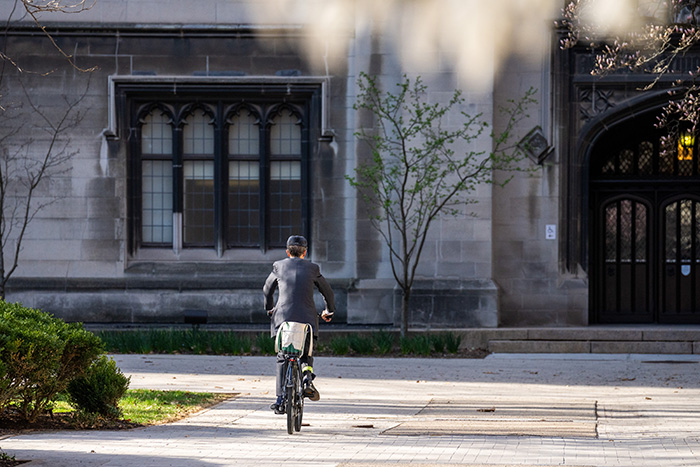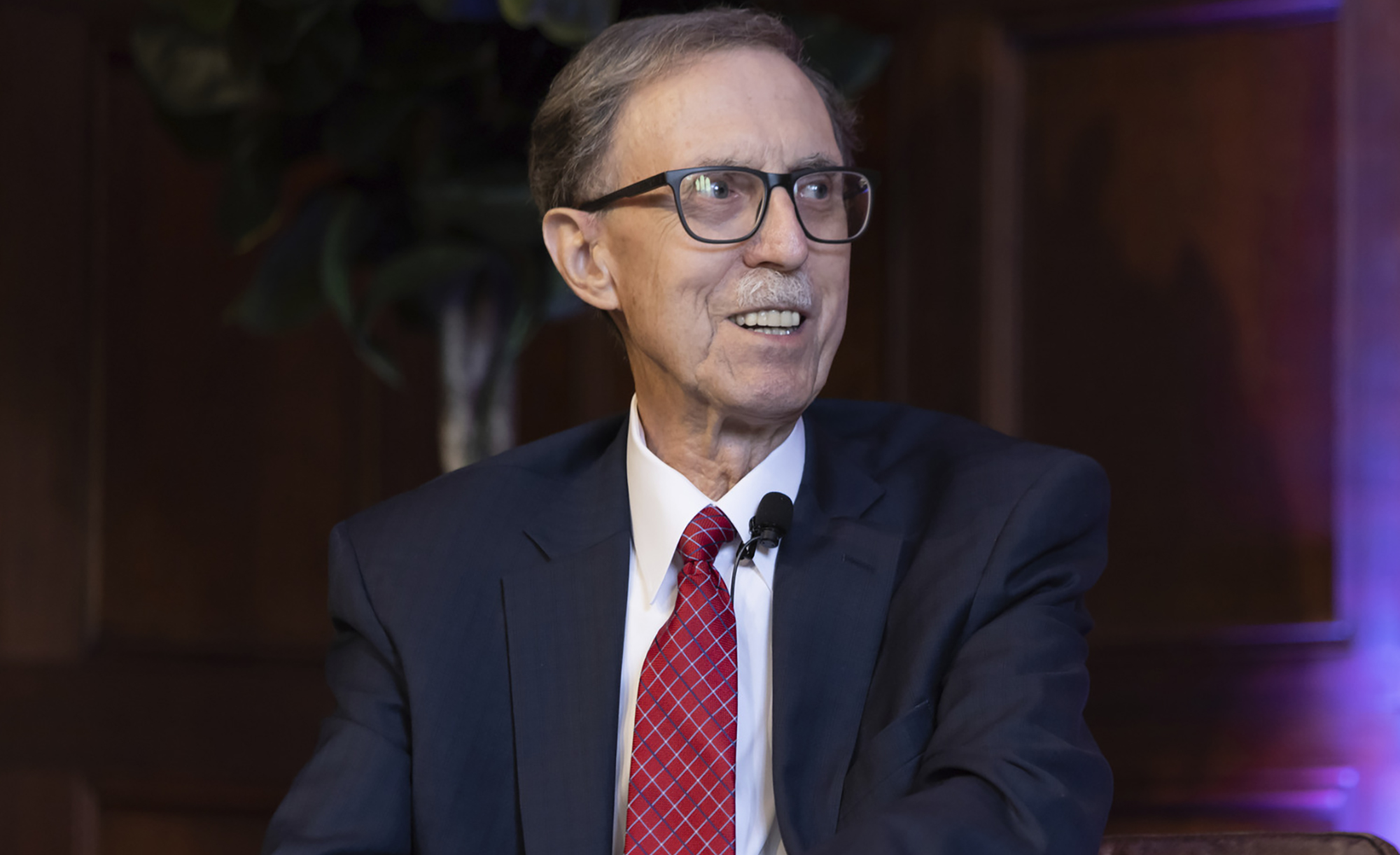
John W. Boyer, AM’69, PhD’75, onstage at the Institute for the Study of Ancient Culture’s Breasted Hall. (Photography by Anne Ryan)
At his final Alumni Weekend as dean of the College, John W. Boyer, AM’69, PhD’75, has a few incendiary words.
On May 19, the Friday afternoon of Alumni Weekend, Dean John W. Boyer, AM’69, PhD’75, sat down with Lauren Henry, AB’05, executive director of UChicago Alumni, for a fireside chat about his 31-year legacy. During the discussion in Breasted Hall, Boyer was warm, witty, and so frank that at various points he felt obliged to apologize to older alumni; Yale alumni; “loyalists to the Shoreland and Broadview” residence halls; and anyone from Essen or Dortmund, Germany.
This interview has been edited and condensed.
What brought you to the University of Chicago?
Life is filled with accidents. I was a local Chicago kid, grew up on the South Side. I went to a local university—a very good Jesuit school.
So I didn’t go away for college, but I wanted to go away for graduate school. I applied to Columbia University to study German history and I won a scholarship. It was the middle of the Vietnam War and SDS, Students for a Democratic Society, occupied Columbia in the spring of 1968 and closed it down.
In those days, if you didn’t go to graduate school, you were going to take a Pacific trip. I was an Army officer, but I was opposed to the war. I didn’t want to go to Vietnam.
So I called up the history department at Columbia and said, “I’m a little concerned. Do you think you’ll be open in the fall?” I got this very frustrated secretary who said, “Young man, if I were you, I wouldn’t come here.”
I had applied to Chicago as a backup school. I got a scholarship there too. I called with the same question and got this somewhat miffed secretary who said, “We’re always open. We never close.” So I came to Chicago in September. The irony is in January 1969—as older alums will know—the students occupied the Ad building and shut our university down.
For my purposes it was a wonderful decision. I probably wouldn’t have done Austrian history if I hadn’t come to Chicago.
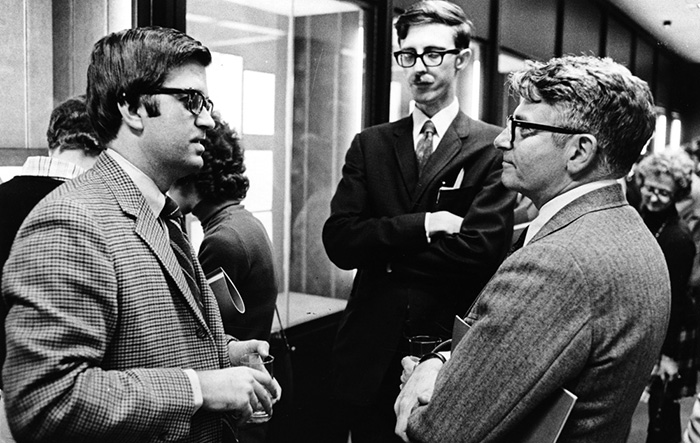
Why Austrian history?
There were a couple of young people on the faculty who were studying Austria and they were both denied tenure. This wasn’t auspicious. But I was fascinated by what they were doing.
I ended up working with an outstanding historian named William McNeill [LAB'34, AB’38, AM’39], a world historian who knew very little about Austria. If your dissertation supervisor knows very little about what you’re doing, there are tremendous advantages.
I originally talked to Professor McNeill about going to Europe to study. He said, “Well if you do German history, you’ll end up in some little town like Essen or Dortmund”—if there are citizens of Essen or Dortmund here, apologies. “But,” he said, “if you study the Habsburg Empire, you end up in Vienna.”
I said, “That sounds pretty good.” So I applied to go to Vienna.
How did you join the faculty?
Universities recruit faculty in various ways. Some are obvious, some are more subterranean.
I had gone to this Jesuit college, and the Jesuits had a core curriculum. It’s called Latin and Greek. Theology. The Bible.
There was an opening in the Western Civ Core—somebody got sick. So the history department chairman called me up and said, “Do you want teach Western Civ?” My reaction was, “Me? What are you talking about?”
Back then there was no teacher training. They would just put people in the classrooms. So in the fall of ’73 I was teaching ancient Athens. I still remember Pericles and Thucydides. First time I ever read Thucydides. I’ve now read it a million times. I found I liked teaching. I didn’t screw it up.
The next year there was a job opening. They said, maybe we’ll consider you. So I applied and got some other offers—one from Cornell, one from Texas, one from Iowa. I went into the chairman’s office, and I said, “I don’t know which one I should choose,” and he said, “Don’t do anything for a week or two.” I didn’t know anything about how these things were done. But two weeks later I was offered an assistant professorship at the University of Chicago.
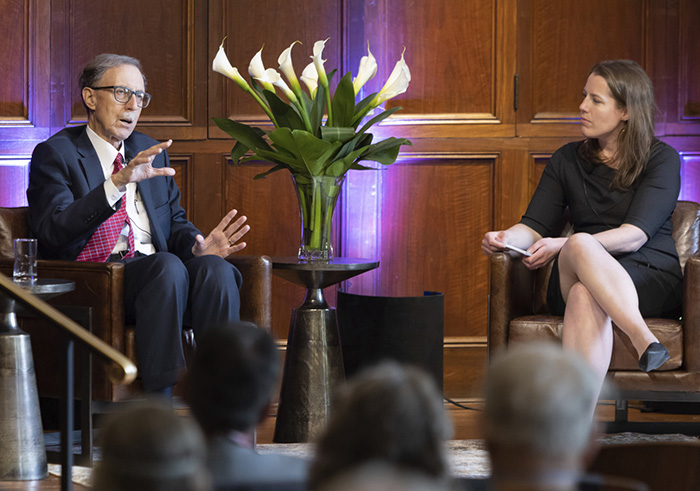
I’m a little nervous to ask this as a College alum, but what were your first impressions of College students?
Some of the students had been expelled as a result of the great sit-in of ’69. The students back then were very bright, very political—in the way one was political back then. I remember in the third quarter of the course we came to Marx, the Communist Manifesto. After about 20 minutes, I said, “Why don’t you take the book? You should teach me. You guys obviously know a lot more about the practicality of Marxism than I do.”
The students then, as now, were there to learn. You didn’t have to force them. It was a challenge to keep ahead of their capacity to learn.
How did you become dean?
I had been master of the Social Sciences Division for five years. I was sitting in my office one day and my secretary said, “Mrs. Gray [Hanna Holborn Gray, Harry Pratt Judson Distinguished Service Professor Emeritus, then president of the University] wants to see you. Right now.”
If you know Mrs. Gray, she’s a formidable figure. When you’re summoned to Mrs. Gray’s office, something is really wrong—or something is even wronger. So I went up there with some trepidation. It was like going to the principal’s office. And she asked me if I wanted to be dean of the College.
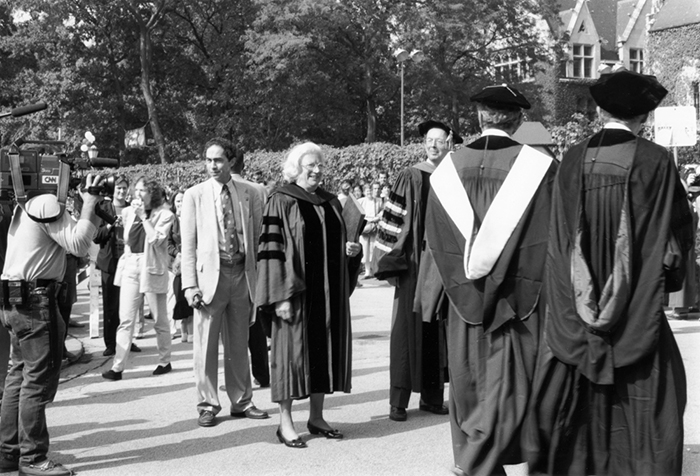
I would not be sitting here without the Metcalf Internship I did in 2004 with the Chicago Symphony—I found my field. The year I had a Metcalf, there were 108. Last year there were 4,200. So how has career support changed since you became dean?
When we began to look at student life—again, apologies to the more senior alums in the room—I noticed we didn’t have children of alums applying to the College. In other elite private schools, they had the opposite problem.
So I began to ask alums why not. And they said, “Well, I got a great education, but I don’t want to put them through that.” It was like a philosophical discussion in Human Being and Citizen: “Well, what’s that?”
One answer to that was the lack of career services. The first year I was dean, 40 percent of seniors had a job when they graduated. There was this huge gap between what was happening to our students and the claims we were making about the value of the liberal arts. You could paper the wall with Martin Luther–like statements about the importance of a liberal arts education.
This is where Byron Trott [AB’81, MBA’82] showed up. He was a Goldman Sachs guy. I was asked by Development to ask him for something—I don’t remember what it was. He said I won’t give you anything for that, but I’ll give you some money to create an internship program.
Frankly, I didn’t know what an internship program was, but I thought, I don’t have one, and he’s going to give me some money for one. Sounds pretty good. He said you have to name it after Jeff Metcalf [AM’53]. I didn’t know who Jeff Metcalf was either.
Byron’s generosity was only exceeded by his wisdom: we should have internships in all fields, and he would pay for a lot of them. This coming June, two weeks from now, 98 percent of grads will have full-time jobs or be in graduate school.
Now that we had this internship program, we roped in some alums to do interviews. You can’t just give these things away. So this alum from the 1970s calls me up and says, “You got a problem. I just interviewed this kid for a business internship. I asked him, ‘What’s your favorite part of the Wall Street Journal?’ And the young man said, ‘Sir, I don’t read the Wall Street Journal.’” This alum said, “You gotta make them read the Wall Street Journal or teach them how to lie.”
I said, “I don’t know about teaching people to lie, and I don’t know about forcing people to read newspapers.” But we went to our visiting committee—there are a number of members in the room today—with the idea of creating the Chicago Careers In … programs, a series of training programs. Not for credit, so we’re protecting the liberal arts. The programs span all the professions, and students get interview training and coaching. And the ones who are interested in business learn they should read the Wall Street Journal.
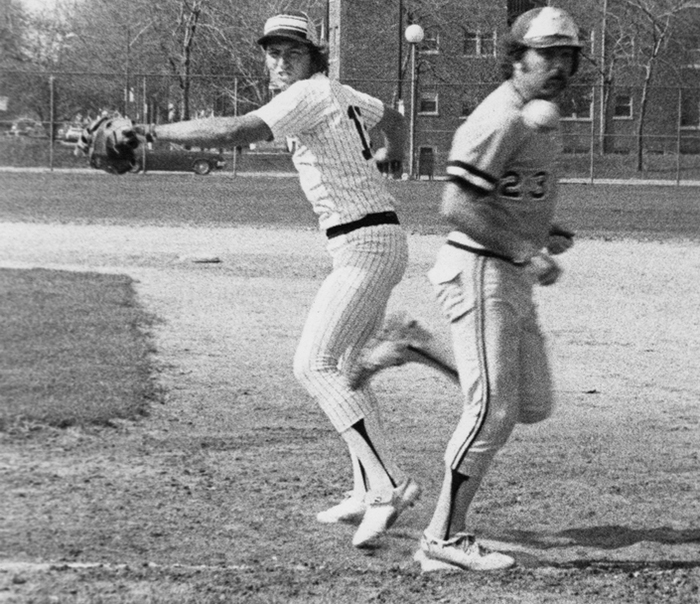
The Center in Paris is going to be named in your honor. I’d love to hear more about your vision for study abroad.
When I was a young faculty member I was appointed to a committee by Jonathan Smith, one of my predecessors as dean of the College. Smith had been told we should have study abroad programs.
The committee had three full professors, whose names I will not mention, and myself. I was an assistant professor, so I didn’t have tenure. We had one meeting in the Quad Club over lunch. And the three professors told me they had already written the report: it was a bad idea, it was a desecration of the spirit of the University of Chicago, you would be nuts to go anyplace else.
When I became dean, I had the idea that since I had lived in Europe for a number of years—and learned something by living in Vienna and in Oxford—that other people could learn something too. In those days, the University did not believe in study abroad.
There was a group of younger faculty, like Philippe Desan [now Howard L. Willett Professor Emeritus in Romance Languages and the College], Françoise Meltzer [now Edward Carson Waller Distinguished Service Professor in the Divinity School, Comparative Literature, and the College] and Robert Morrissey [now Benjamin Franklin Professor of French Literature and the Committee on Interdisciplinary Studies in the Humanities and the College] who thought not having study abroad was ridiculous. Why wouldn’t you want to live in France? You can actually learn French in France. And the pastries, the cheese!
We took the model of Western Civ, which was always taught intensively in the summer. We sent 20 or 30 students and three faculty abroad for a quarter. We did it in Barcelona and it worked. We did it in Tours and then Paris and it worked. Pretty soon, other departments were asking, “Why does the Romance languages department get to send their faculty and students abroad?” I said, “Well, I didn’t say you couldn’t.”
But it wouldn’t have happened without younger faculty who were willing to rebel against their isolationist elders. Generational change is important.
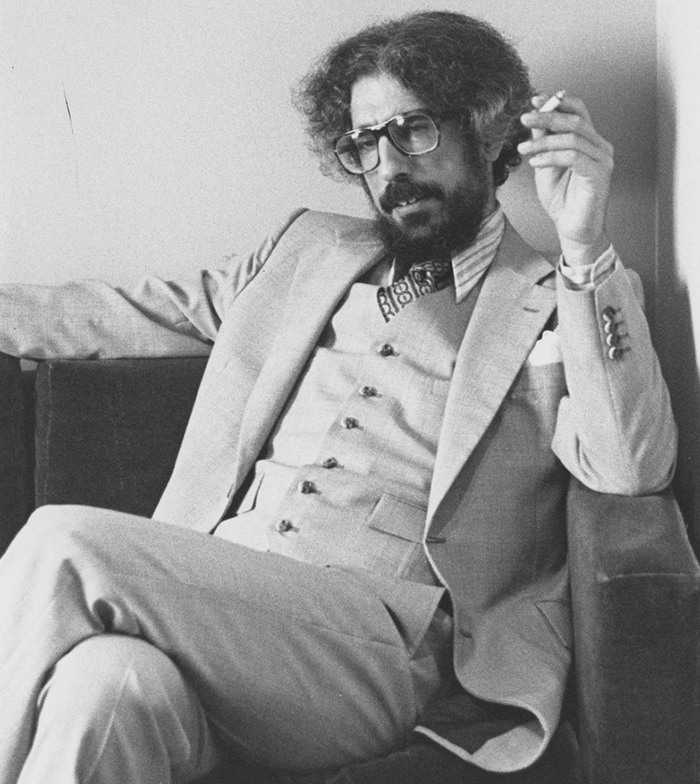
Next we have some questions from the audience. This is kind of a tricky one. How have students changed over the last 30 years?
It’s like the grade inflation question. When people ask if we have grade inflation, I say, “What answer do you want, yes or no?”
The Core curriculum is more or less the same as that experienced by most of the people sitting in this room. When I teach Pericles and Thucydides—as I have done almost every year for the last 40 years—I’m using the same texts and I’m getting the same kinds of papers of the same kind of quality that I was getting 30 or 40 years ago. It’s a testament to the continuity of the place.
Robert Hutchins [University president, 1929–45; chancellor, 1945–51] used to say, “We’re not a kindergarten. We’re not a country club. We’re not a prison.” He attributed all those things to Yale, by the way.
Apologies if there are alums of Yale in the room.
From the academic perspective, students have not changed. You have social media, all kinds of things. The sense of time and place has changed—people think differently about time now. I’m told young people don’t date like we used to. They socialize in other ways.
But the big difference is, when I started as dean, the freshman dropout rate was 13 percent. They just left. They weren’t happy. Our freshman retention rate is now 99 percent.
Changes to housing were profoundly important. I know there may be loyalists to the Shoreland and Broadview. Apologies. But we didn’t want students riding these buses backward and forward.
In the pure academic sense, there’s been much more continuity than change. That’s my experience going back to the 1970s.
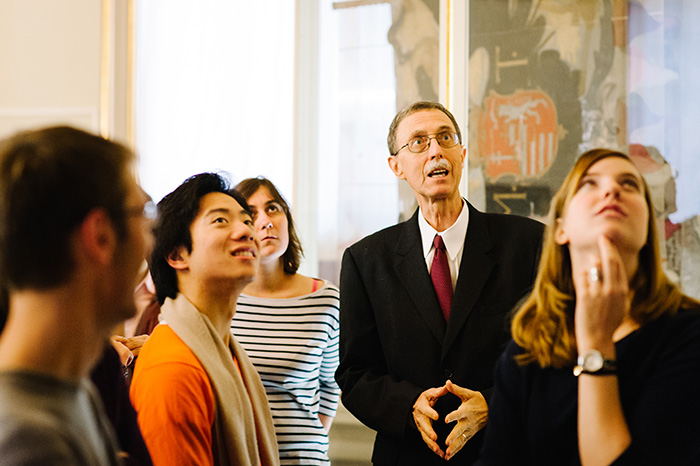
When you were asked to become dean of the College, what led you to accept that invitation?
Well, when Mrs. Gray summoned me to her office, it would be a very brave soul indeed who would not accept her invitation to become a dean.
I guess now, at the end of 31 years, I can reveal it. I was actually nominated for two deanships. The deanship of the social sciences was open as well. So I had a choice, which was unusual.
I talked to a lot of faculty who said, “Take the social sciences deanship.” It was a power deanship of this enormously famous Division of the Social Sciences—all these top five departments, including my own. Only a couple people—one of whom was Allen Sanderson [now senior lecturer in economics], the other was Norman Bradburn [now Tiffany and Margaret Blake Distinguished Service Professor Emeritus in the Social Sciences]—said, “You should do the College.”
I decided to take the College. At the time a lot of people thought I was nuts. I had taken the lesser of the two jobs. And I hope I put that to rest. It’s not the lesser of the two jobs—it’s a great job. And the person succeeding me, Melina Hale [PhD’98] is a great person, and she’s going to do a great job in this great job.
What role have alumni played in the transformation of the College?
They told me the truth in the 1990s about what they liked and didn’t like about their experience. I met fascinating people from all walks of life who were alums of the College of the University of Chicago. They talked with great eloquence about the power of the education they received. It encouraged me. It was worth trying to change some things, even though it might be controversial, to protect that.
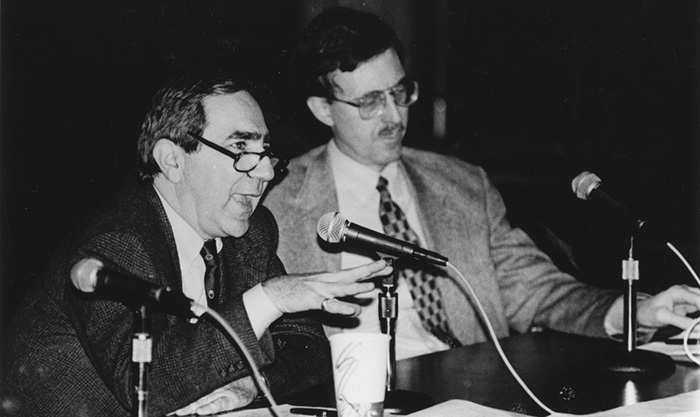
What are some of your favorite memories with students?
There’s a carnivalesque, playful atmosphere with our students. They’re very witty, much given to fun. Last night there was the awards ceremony, and a number of alums were talking about “Where fun comes to die.”
You may or may not know that began with a college rankings book in the 1990s, run by a group of young men—the gender is important—who were trying to figure out the most fun college. They had a whole bunch of questions: When does the weekend begin? How easy is it to get booze? And other more pointed questions which, in polite society, I’m not going to mention.
Jonathan Kleinbard, the vice president for communications, came to me when this thing was published and said, “We got a problem.” We had been ranked something like 300th out of 300, down there with Brigham Young and West Point.
I was pretty naïve at the time. I said, “They’re talking about booze, things that parents of young women wouldn’t like. Surely this will help us in admissions. We’ll be this shining … we’ll be virtuous.”
Jonathan Kleinbard was like a Chicago ward politician. He said, “We’re going to get killed. The headline is going to be ‘Where fun comes to die.’ Nobody’s going to care about the survey. That will be long forgotten. We’re going to be stigmatized.” And that’s exactly what happened.
So that became part of a campaign of transformation. You can deal with this in several ways. If the students make T-shirts, you can try to rip them out of their hands, or try to bribe them, but that would just encourage them to print more T-shirts.
Or you could be philosophical: What are the conditions of possibility that led to this situation? Which brings me back to talking to the alums about the that. There was a connection between the that and “where fun comes to die.”
It’s not that students don’t have fun. They have a lot of fun. But it’s Chicago-style fun. Scav Hunt is an example of that—building atomic reactors without the permission of the Atomic Energy Commission.
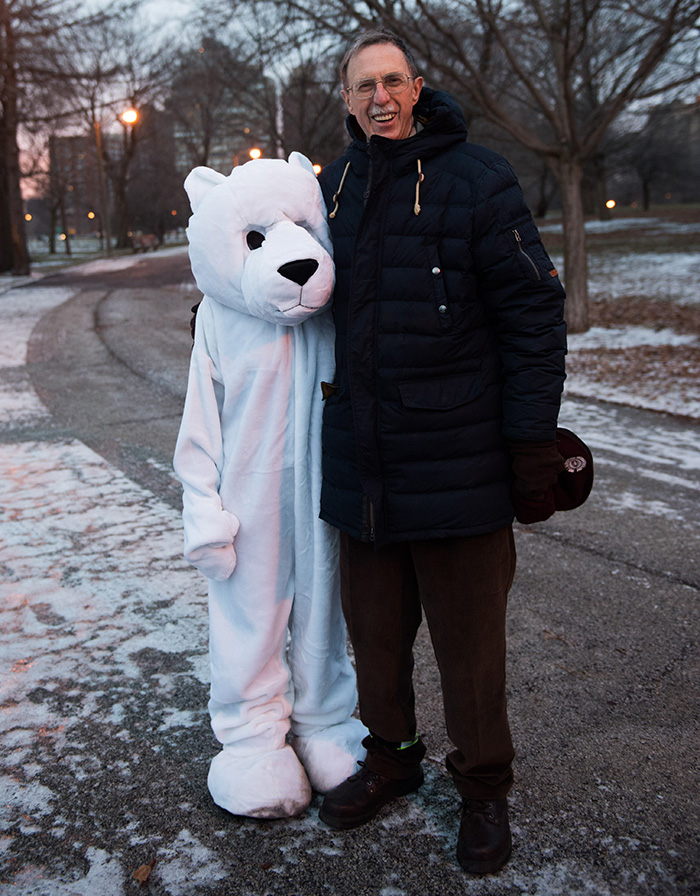
What would Dean Boyer from 1992 say to you today?
That’s a trick question. I’m having to admit I’m not young anymore.
Universities are complicated institutions. They have collective memories, traditions, folkways. Our colleagues in anthropology study this kind of thing for a living.
It is possible to change these institutions. They don’t change easily, and they shouldn’t be changed easily. A place like Chicago is fiercely protective of what it is.
The lesson I would tell my younger self is, with patience and a lot of luck, it’s possible to make change, but it has to be done in a careful, prudential way. You can’t just snap your fingers.
It’s good for people to stick around for a while and settle in. You need to think in decades, not in years, and think in years, not in months. That’s something I learned in the job. I didn’t know that in 1992.
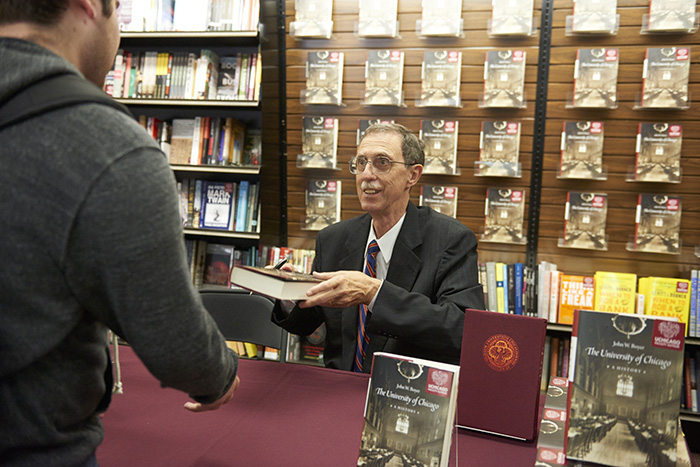
What are you most optimistic about for the University’s future?
I do think the University is well-positioned now. It has a very successful College—it’s doubled in size. It’s now about the same size as Harvard and Stanford.
The other fascinating story—and I’m speaking more as the historian—is the transformation of our professional schools. If you look at Booth, Harris, Law, and Crown, there has been a tremendous arc of change. So the University is well situated with a strong, successful liberal arts college and strong, highly competitive professional schools.
But what has to be done is to rethink graduate education in the arts and sciences. There are profound changes to do with employment and the whole purpose of doctoral education. We became famous in the 20th century for churning out PhDs—like a PhD factory. I mean that in the complimentary sense.
But changes are coming. The mission of all the great universities is going to be to figure out the shape, the context, the future of graduate education.
How has the University changed you?
In some ways it comes back to this call that I got from the chair of the Department of History: “You want to teach Western Civ?” The training I got in graduate school was very conventional—teaching graduate students to learn more and more about less and less. Doctoral education, then and certainly now, was about specialization.
Teaching Western Civ and Soc II—way outside my comfort level, areas of knowledge that I had no familiarity with, that I had to teach myself—profoundly influenced the kind of history that I write. I’ve just finished this huge volume on the Habsburg Empire, 1,000 pages. Some would say it’s a monumental book. For some people that’s a compliment, for some people it’s not. I don’t think, without having taught students in the College, I would have been able to write that book.
Thank you for your candor this evening, and for all you’ve given to students, to alumni, to this institution. I promised Dean Boyer I wouldn’t get emotional [tearing up], but through your work you have changed each and every one of our lives. We’re all so grateful.
I’m delighted that all of you came out and sit here under Mr. Breasted’s portrait and listen to this.
(To Lauren Henry) And I’m really glad that we had the good sense to give you a Metcalf Internship.
